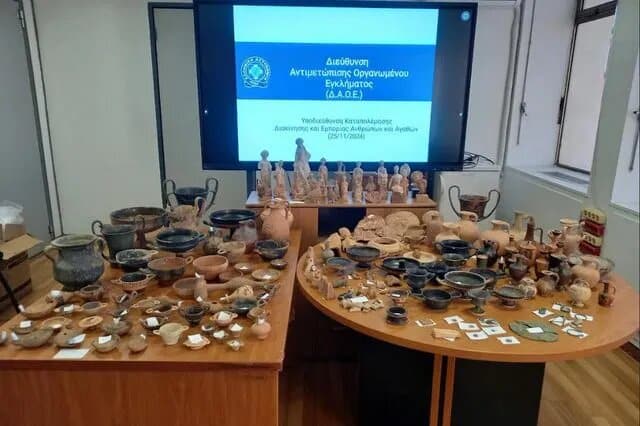

Police seized 172 ancient artifacts and arrested two suspects during a raid on three homes and one vehicle in an Athens suburb.
Among the recovered antiquities are bronze and silver coins, Roman and Byzantine clay lamps, ceramic fragments and vessels such as kylikes and lekythoi from the Archaic to Hellinistic periods. The local Ephorate of Antiquities confirmed their authenticity and opined that the items fell within Greece’s laws for the protection of cultural heritage and antiquities.
The two suspects, who are brothers, were referred to prosecutors. They face charges for violating cultural heritage protection laws.
The operation took place in Alimos, a suburb in southern Athens on Monday, November 25, after police had been tipped off about the presence of a large number of ancient artifacts in an apartment in the area. After investigating and assessing the information, they decided to immediately raid three apartments.
Police first raided the ground floor of the apartment building and then the apartments on the third and sixth floor, where the artifacts were found. The two brothers, one of whom is reported to be a lawyer, were also found in one of the apartments and were immediately arrested.
Police investigating the case are troubled by the very large number of artifacts recovered, as well as about their origin since they suspect they originated from a museum. Reports say that the father of the two suspects worked at a museum in Athens.
In May 2024, Greek police recovered a kouros statue torso and an ancient gold coin among other artifacts before they were sold for millions by antiquity smugglers.
In an official announcement, the Hellenic Police (EL.AS) said they conducted an extensive operation in houses in the areas of Attica and the nearby province of Voiotia, where the antiquities were found and confiscated. Three people were arrested and a case was filed against them for setting up a criminal organization and violation of antiquities and weapons laws.
According to the police, the gold coin (Statira of Ptolemy I of Egypt) has a remarkable cultural and historical value because it is a very rare solid coin, with only seven of its kind in existence.

In March 2024, Greek police on the island of Evia arrested a suspected antiquities smuggler who had 38 ancient Greek coins in his possession and other antiquities that he intended to sell to collectors.
The ancient coins were examined by the Ephorate of Antiquities of Evia who ruled that they constituted objects of significant historical and archaeological value because they belonged to the same time period, dating between 320-280 BC.
